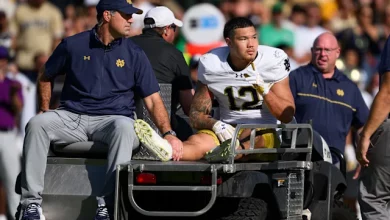Regarding his transfer from LSU, Syracuse quarterback Rickie Collins said, “I kind of knew where I was going.”

In the world of college football, player transfers have become increasingly common, as athletes seek better opportunities for playing time, development, or a change of scenery. One of the more notable transfers in recent months is that of former LSU quarterback Rickie Collins, who made the decision to leave Baton Rouge and transfer to Syracuse. This move has raised several questions about his reasons for leaving LSU, the path he sees ahead of him at Syracuse, and how this change will affect his future. In a recent interview, Collins provided insight into his decision, saying, “I kind of knew where I was going.” This statement hints at a sense of certainty and clarity in Collins’ mind about his next steps, despite the complexities surrounding his transfer.
In this article, we will explore Collins’ time at LSU, the reasons behind his transfer to Syracuse, and how his future could unfold in a new environment. We will also examine how Collins’ decision to leave LSU reflects broader trends in college football and what it means for both him and the Syracuse program moving forward.
Rickie Collins: A Rising Star at LSU
Before his transfer, Rickie Collins was a highly-regarded quarterback prospect out of Baton Rouge, Louisiana. Collins was an impressive recruit for LSU, initially joining the Tigers with high expectations. A dynamic dual-threat quarterback, he was known for his mobility, arm strength, and playmaking ability. As one of the top quarterbacks in his class, Collins had been viewed as someone who could develop into a significant contributor at LSU.
However, despite his promising potential, Collins found himself in a crowded quarterback room at LSU. With veteran quarterbacks like Jayden Daniels taking the lead and other highly-rated recruits entering the program, opportunities for Collins to see meaningful playing time were limited. Even though LSU has been a powerhouse in college football, maintaining a high level of competition at every position, including quarterback, can make it difficult for young, developing players to get the snaps they need.
Over his time at LSU, Collins struggled to crack the starting lineup, and it became apparent that his future at the school was uncertain. With Jayden Daniels’ stellar performances as the Tigers’ starting quarterback, and with other promising quarterbacks ahead of him on the depth chart, it was clear that Collins would have to wait for a significant opportunity that might not come soon. This situation is not unique to LSU; many top-tier programs like LSU have a wealth of talent at the quarterback position, which can make it difficult for young players to find a path to starting roles.
For Collins, the lack of immediate playing time and the growing competition likely led to feelings of frustration and a realization that he may need to explore other options to reach his potential. Ultimately, Collins made the decision to transfer, and it was clear that finding a situation where he could play regularly and continue his development as a quarterback was paramount in his decision-making process.
The Transfer Decision: “I Kind of Knew Where I Was Going”
When Rickie Collins made the decision to leave LSU, many wondered what factors played a role in his transfer and where he might end up. The quarterback market in college football can be highly competitive, with many players seeking the best possible fit for their skills, needs, and goals. In his interview, Collins revealed a significant aspect of his decision, stating, “I kind of knew where I was going.” This comment suggests that Collins had already identified Syracuse as a program that fit his needs, offering him the opportunity for more playing time, a fresh start, and a chance to further develop his abilities.
Syracuse, under head coach Dino Babers, has been rebuilding its football program and has shown flashes of success, but has struggled to compete consistently in the competitive ACC. Still, Babers has worked to create a program where athletes, especially quarterbacks, can thrive. Collins likely saw Syracuse as a place where he could immediately make an impact, both for the team and for his personal development.
It is also worth noting that transfer decisions are often heavily influenced by relationships with coaches, familiarity with the offensive system, and a desire to find a school that supports a quarterback’s style of play. Collins likely felt a connection with Babers and Syracuse’s offensive philosophy, and he may have recognized that the Orange provided an environment where he could grow without being buried on the depth chart.
The “I kind of knew where I was going” comment suggests that Collins had done his homework and understood the opportunities available to him at Syracuse. Perhaps it was a combination of familiarity with the program, the opportunity to play sooner rather than later, and a belief in the coaches’ ability to develop his skills that made Syracuse a natural choice for Collins.
Syracuse: A Fresh Start for Collins
The decision to transfer to Syracuse presents an exciting new chapter in Collins’ career. While the Orange are not considered a powerhouse program in college football, they provide Collins with a more immediate opportunity to earn a starting role and showcase his talents. At Syracuse, Collins will likely be able to compete for the starting quarterback position, something that may have been more difficult for him to achieve at LSU given the depth and competition at that position.
In his first year at Syracuse, Collins will have the opportunity to compete against other quarterbacks for the starting job. Although Syracuse has quarterbacks like Garrett Shrader and a number of young players on the roster, Collins’ arrival adds a new dynamic to the quarterback room. It’s possible that Collins could secure the starting job early on, or he could spend some time learning and developing before eventually taking over as the leader of the offense. Either way, the move to Syracuse presents him with an environment where playing time is much more attainable than at LSU.
The offensive scheme at Syracuse may also align well with Collins’ skill set. Known for his dual-threat ability, Collins’ ability to make plays with his legs and his arm will fit well within a system that values versatility at quarterback. Syracuse has been known for utilizing mobile quarterbacks in the past, and Collins could be the next signal-caller to take advantage of that system.
Another key aspect of Syracuse’s appeal is the opportunity to develop as a leader. For a quarterback like Collins, stepping into a leadership role is crucial for both his growth as a player and his future prospects. By transferring to a program like Syracuse, Collins has the chance to command the offense, establish himself as a key figure in the locker room, and continue developing his football IQ in a more hands-on, high-pressure environment.
The Growing Trend of Quarterback Transfers
Rickie Collins’ transfer to Syracuse is part of a broader trend in college football in which quarterbacks, in particular, are frequently transferring to other programs in search of more playing time, a better fit, or a fresh start. With the rise of the NCAA Transfer Portal, more and more players are entering the portal in hopes of finding new opportunities. This is especially true for quarterbacks, who, as the leaders of the offense, are often evaluated based on their playing time and development.
For many quarterbacks, sitting behind established starters at major programs like LSU can be a frustrating experience, leading them to explore options at schools where they may have a clearer path to the starting job. Transfers are also influenced by changes in coaching staff, offensive schemes, and a player’s desire for a different environment. In Collins’ case, the opportunity to transfer to a program like Syracuse, where he could immediately contribute, was an attractive option that would allow him to continue his college football journey.
The increase in quarterback transfers also reflects the growing importance of player autonomy in college football. With NIL (Name, Image, and Likeness) deals and more lenient transfer rules, players now have more control over their futures, and quarterbacks, in particular, are exercising that control to ensure they can find the best fit for their development.
Looking Ahead: What’s Next for Rickie Collins?
As Rickie Collins prepares for his new chapter at Syracuse, there are several key questions about what the future holds for him. First and foremost, his performance on the field will determine his trajectory at Syracuse. If he can quickly adapt to the offensive system and secure the starting quarterback position, Collins could emerge as one of the key players in the ACC and lead Syracuse to new heights. His dual-threat ability gives him an edge, and if he can stay healthy and continue to develop as a passer, he could position himself as a future NFL prospect.
The move to Syracuse also gives Collins a chance to refine his skills under the guidance of coaches who will be focused on his development. With the right mentorship, Collins could become the type of quarterback who can lead a program to success and open doors for a professional career in football.
For Syracuse, bringing in a player like Collins is a significant step forward for the program. His arrival adds depth and competition to the quarterback room, and it gives the coaching staff an opportunity to build their offense around a talented signal-caller who can make plays with both his arm and his legs.









